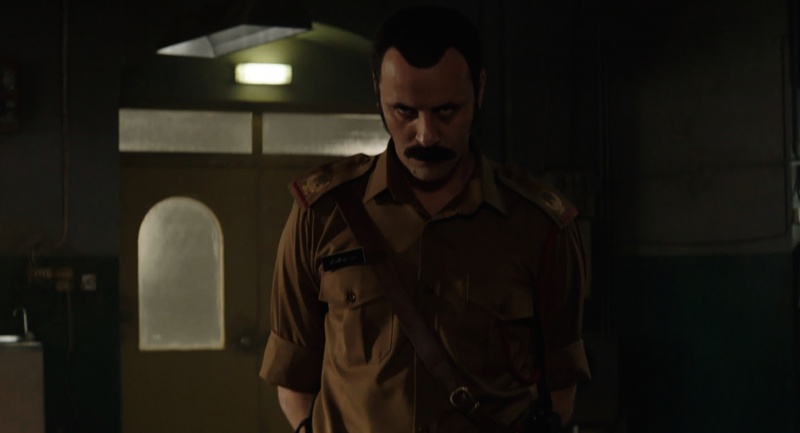Billed as the first genre film from the United Arab Emirates, a region that has only begun to develop a film industry in the past decade, “Zinzana” is proof that when there’s no obvious road map, that’s when the opportunity to take movies in exciting new directions can happen. With his debut feature, which for English-speaking audiences is entitled “Rattle the Cage,” Majid Al-Ansari does exactly that and then some with a thriller that may be confined to a single setting yet goes every which way in preposterously entertaining fashion.
Featuring two of the Middle East’s most celebrated actors in Ali Suliman (“Paradise Now”) and Saleh Bakri (“The Band’s Visit”) on screen together for the first time, the film finds a prisoner named Talal (Bakri) of an unspecified crime locked up in a Jordanian detention center, his cries of innocence falling on deaf ears. However, that turns out to be the least of his problems with the arrival of Dabaan (Suliman), a merciless yet wildly charismatic killer posing as a higher up in the police force. Why Dabaan takes an interest in Talal is unclear, and he has no interest in killing him, at least at first, but it isn’t before long that Talal starts plotting an escape, even as Dabaan watches over him like a hawk.
Al-Ansari ratchets up the suspense by not letting either of them go unwatched, pirouetting around the room with his camera as if he’s making a film about the ballet, yet as soon as you see Dabaan actually start to dance, you realize this is no ordinary cinematic standoff. For every bit as taut as the screenplay from Lane and Ruckus Skye is, Suliman, who often has played noble characters, cuts loose as the mustache-twirling Dabaan, who keeps Talal and the audience guessing about his motives and what he’ll do next, giving the film a crackling energy and while his performance is delightfully over the top, it’s Al-Ansari’s impressive narrative economy and restraint that keeps the excitement from spiraling into chaos.
Shortly after “Zinzana” won over an unsuspecting crowd at Fantastic Fest and a provocative new filmmaking voice was anointed, Al-Ansari and the film’s producer Rami Yasin spoke about the challenge of making a single-setting contemporary potboiler in a region that typically only produces movies about the past, how Al-Ansari’s background as a film executive informed what he’d do on the set and getting the film’s unique seriocomic tone just right.
Majid Al-Ansari: I was an executive working at Image Nation and we read a lot of scripts. The script for “Zinzana” came along and I loved it. I love that it was contained in one room and and the hero is stuck in the cell. He doesn’t take one step outside. Then you have this crazy, charismatic guy Dabaan. [Both Rami and I thought] “Oh yeah, it’s a big challenge. Bring it on.” I did a short before, which was very visual and this is more performance-based and it just spoke to me. I had an 18-page presentation, which was like, “This is how I want to shoot it. This is the visual style.” and basically, I went to Image Nation and said, “Okay, I’m leaving the company so I can direct this. Do you mind if I pitch it for you guys?” There’s not a lot of directors in the Middle East, especially with genre films. I grew up watching Park Chan Wook and Bong Joon Ho and of course, [Quentin] Tarantino and Robert Rodriguez – good genre films – and I thought it was my cup of tea. So I pitched it and I got it.
When nobody’s made a movie like this before in the United Arab Emirates, is it difficult to find a crew that you can get on the same page?
Rami Yasin: Not really, but it depends. A large [part] of the cinema [community] is auteur-based, [with] directors from Lebanon, Palestine, Georgia and [elsewhere] making films about their experiences, so they’re more social issue-oriented and a lot crews like to work on that. But there’s also a lot of crew [members] that are like, “Wow, we’re actually going to make a psychological thriller?” Everyone that we spoke to, we’re like, “Look, this is the kind of film that we’re making” and a lot of people bought into the vision. Majid also did a lot of ground work and he had a very clear vision from the beginning.
Majid Al-Ansari: Some of crew was international, too. I think 80% of it was of course from Jordan.
Rami Yasin: Our production designer was from Germany, our cinematographer was from Belgium. The Russian designer was very experienced in movies that are set-based and of course, that was very important because this is a container film, and we were worried all the time about the audience losing interest. Even though the characters were so strong and colorful and complex, we knew that the world we have to be top notch. The [director of photography] was someone that Majid had researched and had worked with one of his favorite directors before.
Majid Al-Ansari: Hélène Cattet and Bruno Forzani [the directors of “The Strange Color of Your Body’s Tears”] – I went to Rami, “This is one of my favorite fucking films ever, so I want to same crew. We were lucky enough to get Colin [Leveque, the film’s 1st Assistant] on board [as our cinematographer] and the gaffer and the focus pullers were from there also.
Rami Yasin: It was a very tight-knit crew. We spent the first couple of weeks together just building this world and understanding [Majid’s] vision and how he wanted to shoot it. Between what’s on the page and the way that it was executed, we stayed very true to the heart of the story, which was important for us. Even though it’s a genre-based film, we found a lot of truth in it that was relevant to our region. There’s never been a movie that tackled the issue of alcoholism in this way and then the issue of family. Family is the cornerstone, and to have the hero and the villain, who at the end of the day, both fighting for the same thing — their family each in their own way was something that we enjoyed a lot and believed the audiences in our region would relate to. There’s a lot of taboo subjects in our region that people just don’t like to discuss and just brush under the table. There’s never been a film that unfolds in this way, so we can’t wait for it to get released in our region and see their reactions.
You mentioned at the film’s premiere that this was the first time Ali Suliman and Saleh Bakri, two major stars in the Middle East, had never been in a film together. After they were cast, did the script change much based on the expectation of what audiences might want to see?
Majid Al-Ansari: The script had a tight vision as far as what this film is going to be and the visual style of the film, but it wasn’t a dictatorship. Working with Ali Suliman, I didn’t know what I was getting into. I watch more foreign films, so I’m not as familiar with the Arab world as Rami is, and it was more about the collaborative spirit [amongst the actors]. Talal, the hero, was a harder character to lock down than Dabaan because Dabaan is very charismatic. Everyone has this evil side inside them and Ali is this quirky guy who came up. But Saleh Bakri did an incredible job to sustain this very introverted character that doesn’t leave this small space and yet holds the scenes. Because of that, I think those scenes really flourished.
Rami Yasin: We always loved the structure, but we went through two or three rounds of adaptations of the script to make sure the story unfolded really beautifully and the beats were there at the right time. Once we got this cast on board, we spent two weeks working with them, going through all of the scenes, taking a lot of notes about how they felt and developing more about what their background is. Then we’d do rewrites on these scenes, predominantly on the dialogue. The action rarely ever changed. We’d go back [to the actors] and say, “Okay, so how does this sound?”

Rami Yasin: More of that was from Majid. There’s a lot of homage to ’80s [TV] commercials.
Majid Al-Ansari: The whole scene where [Dabaan does a countdown], “3, 2, 1” on the phone is from a 1980s Raid commercial in our world. The tone was definitely planned. Because we were in one location, I split [the scenes] up in blocks [and asked] what is the tone? [This is true] even with the effects we used. Yes, [we’re confined to] a small space, but I wanted the camera to be free to dance wherever it wants to go, so if it wants to go through walls, it can go through walls. If we want to go up into the sprinkler, it can go from room to room and space to space, so that’s how the plan came together and hopefully, that what you’ve experienced. It doesn’t feel repetitive, even though it’s just in one room.
That comes across visually, but also in a clever way as far as every object that’s in the room ultimately serves the story, even though you might not expect it. Was it difficult to figure out what those objects were?
Rami Yasin: The original script was a lot more bare and stripped down compared to the kind of world we built and all of these small tiny elements that we have in there. Everything had a reason and a purpose, including the calendar that was on the desk — for example, that first scene when you come out it tells you the year and the place that you’re in, so everything was thought of.
Majid Al-Ansari: The production designer Benedikt Lange was really incredible to work with, and it’s funny because [since] it’s one location, he gave us a floor plan before really even talking to me. His idea was we have to make it complex, and have corners so it’s more cinematic. But we [came to the decision] to keep it open, like a playground for the performers. It’s a performance-driven film, so then it became about focusing on the details, and then he ran with it. It’s literally a cell, a desk, and then [empty] space, so then he just went into the details of those walls and the [other] small stuff of that world would be. You can see the character in one of the shots, and the details all around it [tell you about the character].
Was this an actual location you dressed or did you build this as the set?
Rami Yasin: We built it. We [rented] a sports hangar and spent four weeks soundproofing it and creating offices there. We lived there for the five weeks of prep and five weeks of filming. The hangar was like 14,000 square meters and our set took about two-thirds of that space. We built everything there from scratch, with moveable walls. The only things that were not built by hand were the original props that we found from the ‘60s and ‘70s, [which were available because] we shot the movie in Jordan.
Was there a particular logistical challenge you had to overcome?
Majid Al-Ansari: Just shooting the movie. [laughs] I was so nervous, but thank God Image Nation, the studio that gave me this opportunity to make it, surrounded me with the best team possible. I’m also very grateful to have Rami, who not only has a producing background but also has a directing background and there’s nothing better than to have a team that you trust. I also love prep and I think prepping is making the movie and [once] you shoot, you are managing the movie. You can only do that when you have the team that you know has your back. But I was really terrified. I gained about 35 pounds during the shoot.
Rami Yasin: That’s because catering was really, really good.
Majid Al-Ansari: Really good! [laughs] And I hate you for it [looking at Rami]. But the shoot was all a blur because I was so nervous. Keeping my patience was my biggest challenge, really. But everything was prepped so well that we knew every shot and even our [assistant director] knew that, “Okay, we’re shooting this and we have to move the walls.” Everything was looked at in advance.
Rami Yasin: One of the most challenging things that we found was deciding how to paint to walls of that set.
Majid Al-Ansari: Four weeks!
Rami Yasin: [It took] four weeks. In and out in an out, painting, trying new things. We were struggling with it because we’re like, “Okay, you’re going to point the camera here on a close-up, then you’re going to go do the reverse.” I think we finally got it right the last week. We did the final test on it, and [realized], “Okay, this works.”
Majid, did your background, having come up through Image Nation on the other side of production, help?
Majid Al-Ansari: When I started at Image Nation, I was an intern and Rami was actually the guy who hired me, so I literally did everything from the ground up. I got to see all the different departments, so I had a good knowledge of the different spaces in the film set. And the whole purpose of [working at Image Nation] was to learn the business side of filmmaking. The CEO and the Chairman of Image Nation, who are really awesome and really supportive of young talent, said, “Okay, you learned filmmaking, but you need to learn the other side of filmmaking — how to interact with studios and with executives.” Because you don’t want to be an artist that goes on the film set and becomes this diva, saying, “I want it this way and I won’t take it any other way.”
Working at Image Nation taught me how to communicate. That’s one of the reasons things went so smoothly on this. Rami and I knew the other world of [filmmaking]. As a director, it’s all about positive energy, so just knowing what I learned from Image Nation, the communication skills that I had with everyone and with the studio and with the producers, just made things easier. It didn’t make it like I’m fighting for something [alone], but [instead of] fighting for my vision of the movie [on my own], we were fighting together.
“Zinzana” does not yet have U.S. distribution. It will next play the London Film Festival on October 17th and 18th and open in the United Arab Emirates in December.





